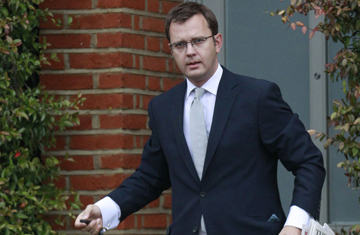
Former News of the World editor resigned as Prime Minister David Cameron's director of communications, on January 21, 2011
When Tony Blair's spin doctor Alastair Campbell resigned in 2003, he said his position had become untenable once he "became the story" over his role in the British government's decision to go to war on Iraq. It's a rule of logic that Prime Minister David Cameron's increasingly beleaguered director of communications, Andy Coulson, resisted for months. But now he has succumbed amid renewed questions surrounding his knowledge of phone tapping by his journalists during his time as editor of a Sunday tabloid.
In his own version of Campbell's dictum, Coulson quit 10 Downing Street on Friday morning in a bid to spare his boss further embarrassment, declaring: "When a spokesman needs a spokesman, it's time to move on." Only a few days earlier, Cameron had stood by his man, insisting he had given Coulson a "second chance" in 2007, after the affair which led to his resignation as editor of the News of the World.
It all began when Prince William told police he believed his mobile phone messages were being broken into, which led to a 2006 investigation into phone hacking by News of the World reporters. The paper's Royal editor, Clive Goodman, and a private investigator, Glenn Mulcaire, were arrested later that year and in 2007 Goodman was jailed for four months and Mulcaire for six months for hacking into the phones of members of the royal household.
Coulson denied all knowledge of their activities yet took responsibility and resigned. Shortly after, he was snapped up by Cameron to act as the Conservative Party spokesman. But Coulson could never shake the controversy completely, and since then a number of celebrities and politicians — including Gwyneth Paltrow, George Michael and former Labour deputy prime minister John Prescott — have come forward claiming their phones have been hacked by the News of the World.
Recently, the saga seemed to be dying down. Until last September, when the New York Times revived the row with an investigation suggesting that phone hacking was widespread at the News of the World during Coulson's editorship from 2005-2006. A former reporter with the paper and the source of some of the Times' story, Sean Hoare, told the BBC that phone tapping was "endemic" within the industry and that Coulson had personally requested that Hoare engage in the practice , an allegation which Coulson denies.
Then in early January, the tabloid suspended its news editor, Ian Edmondson, over fresh accusations of hacking thought to involve the actress Sienna Miller — again during Coulson's editorship. (Edmondson too denies any wrongdoing.) Two days later the Metropolitan Police sought new material relating to the allegations.
Britain has a long history of celebrities, in particular, finding themselves on the receiving end of the tabloids' notoriously aggressive attentions. In 2004, supermodel Naomi Campbell won a breach of confidentiality case against the Daily Mirror over pictures of her leaving a Narcotics Anonymous meeting. In 2008, Miller took action against the Sun and the News of the World over the publication of topless pictures of her. And the following year, Kate Winslet successfully sued the Daily Mail for its false suggestion that she lied about needing little exercise to keep in shape.
The News of the World, in particular, has become famous for its investigative reporter Mazher Mahmood, who recently exposed the Duchess of York, Sarah Ferguson, for offering up access to her former husband Prince Andrew for £500,000 ($800,000). Mahmood (aka the Fake Sheikh) specializes in the classic Fleet Street sting, and secretly filmed Ferguson agreeing to "open any door you want" to a wealthy businessman — Mahmood in disguise.
It is these types of tactics that have led many to question whether Coulson was as unaware of his reporters' behavior as he has always claimed. They also had many wondering about Cameron's judgment in employing Coulson as his communications director. With the New York Times investigation giving the story new life, the likelihood of collateral damage to the prime minister had intensified to the point where Coulson felt he had no choice but to fall on his sword.
Cameron may well be saddened to lose the sort of coal-face experience Coulson brought to his spin operation — and most close to the government agree he was a formidable operator. But even the prime minister is likely to agree that when your spokesman needs his own spokesman, something has to change.
